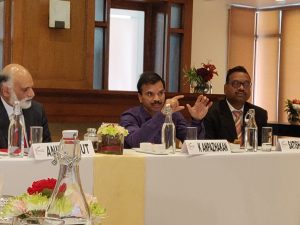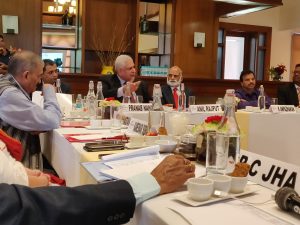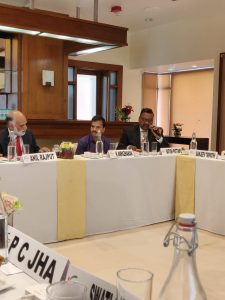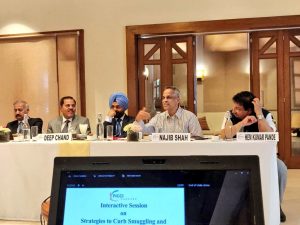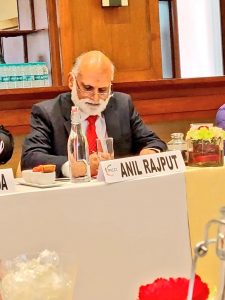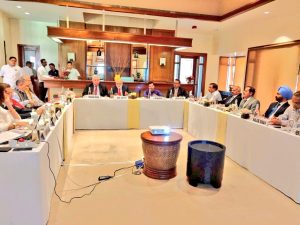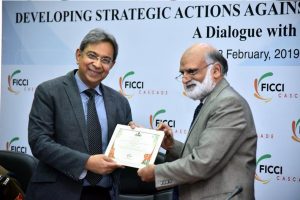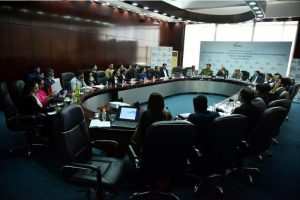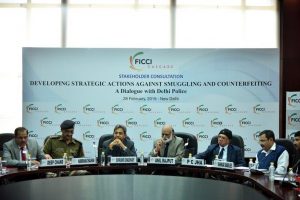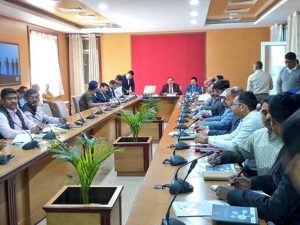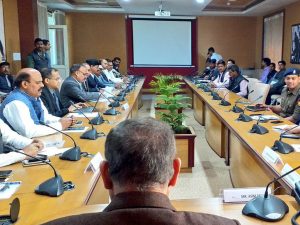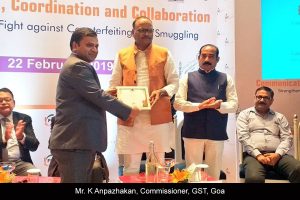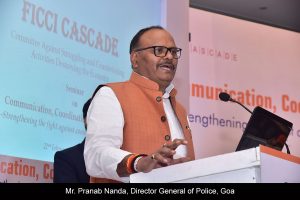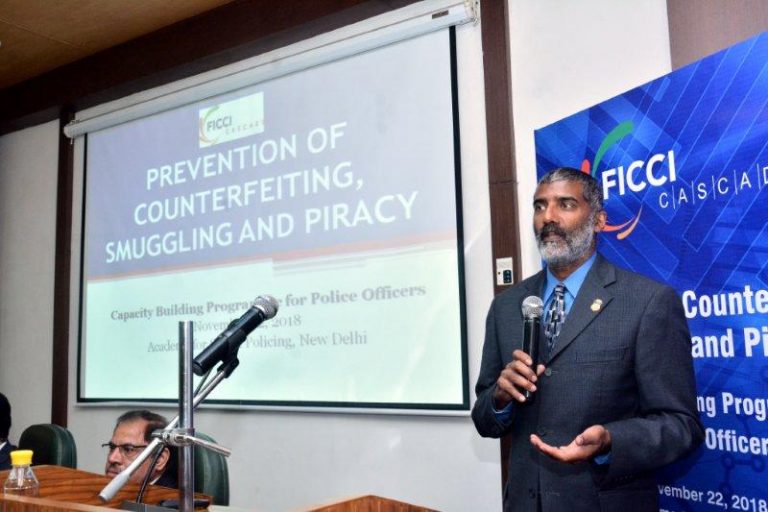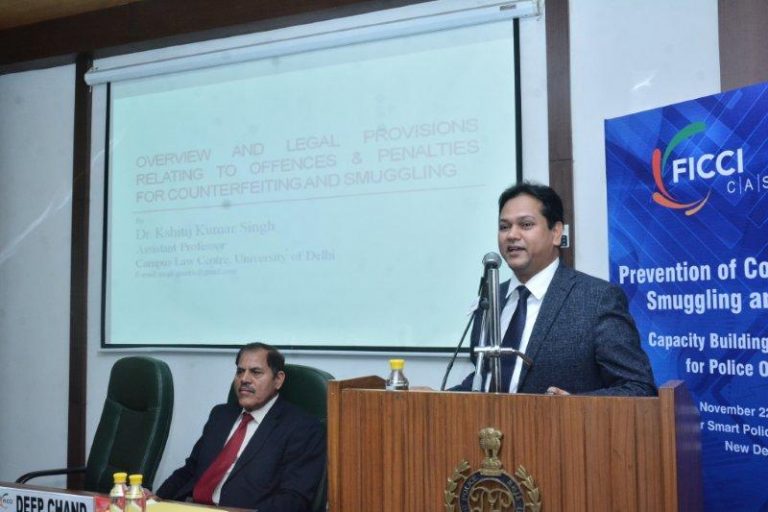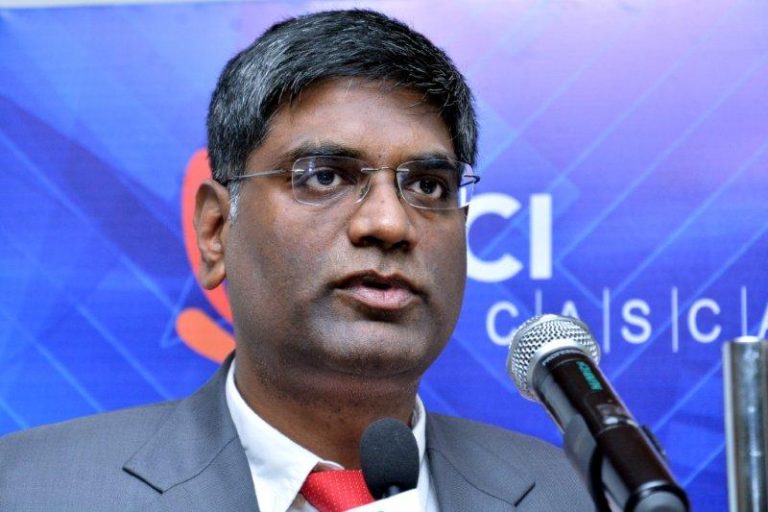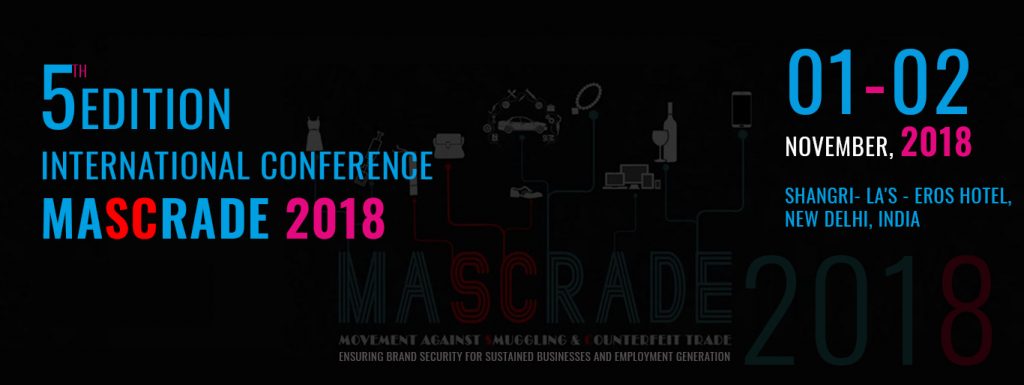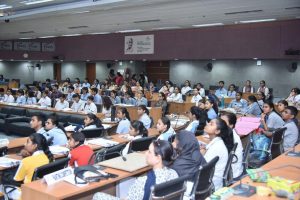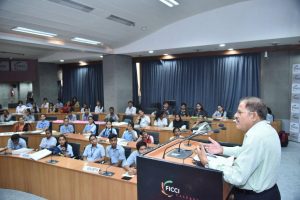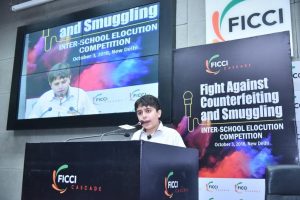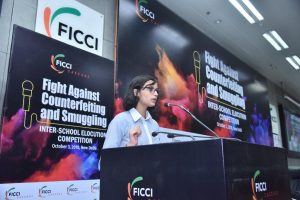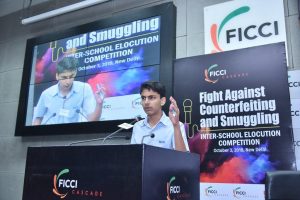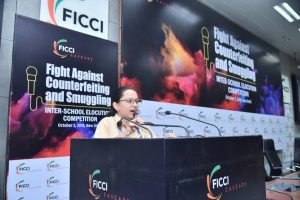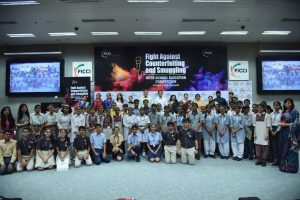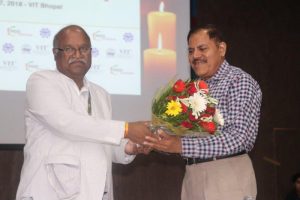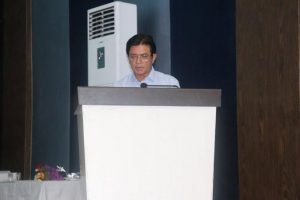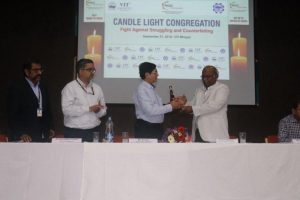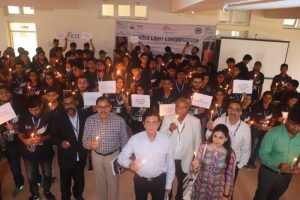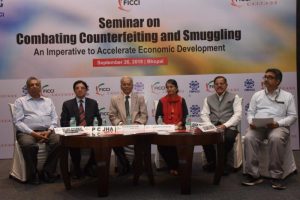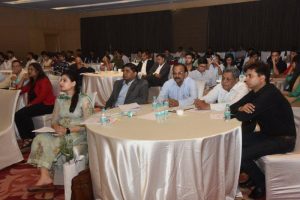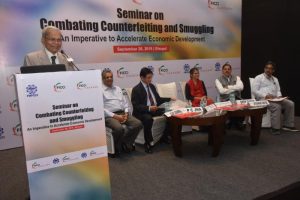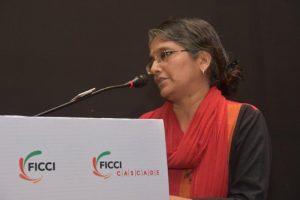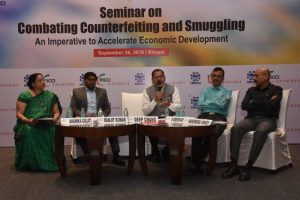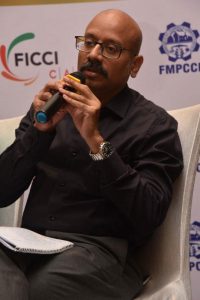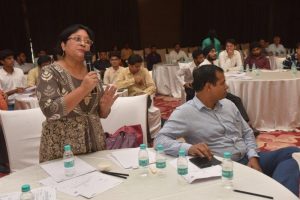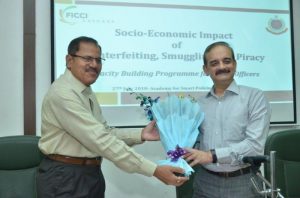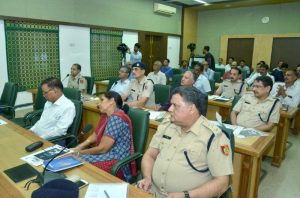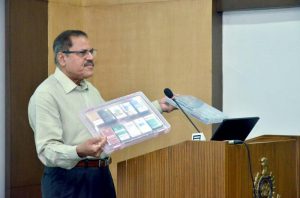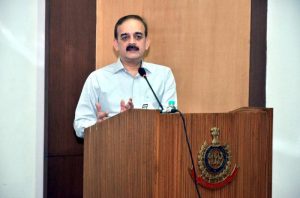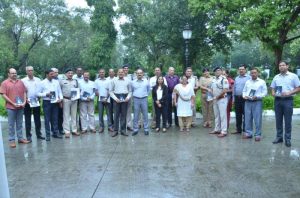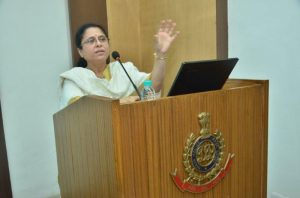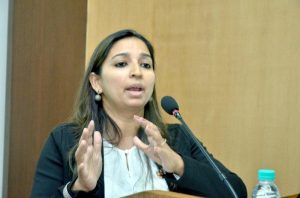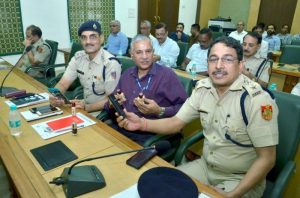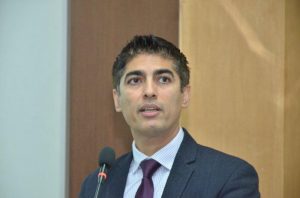Interactive Session on Strategies to Curb Smuggling and Counterfeiting, Goa
13/03/2019| Goa
Smuggling and counterfeiting which are termed as illicit trade is today the biggest challenge facing our country. It is also the world’s largest growing economic menace. Owing to its rather complex nature, its size is hard to determine. However, various estimates suggest that over the last ten years, the magnitude of illicit trade has grown from USD 650 billion to about USD 3 trillion, and this criminal activity represents 10 per cent of the global trade, being rightly termed by the FBI as the ‘crime of the 21st century’. It is evident that the hazards of illicit trade are serious which needs to be dealt with sincere commitment leading to result-oriented effective steps addressing this challenge. In order to brain storm on strategies needed to address the problem, FICCI CASCADE organized an Interactive Session on Strategies to Curb Smuggling and Counterfeiting on 13th March 2019 in Goa. This interaction between FICCI CASCADE Think Tank members and representatives from the Government of Goa was organized with the intent to facilitate a wider exchange and ensure a multifaceted perspective to not only understand the risks caused by illicit trade activities but also search for remedial measures to contain this concern.
Mr. Anil Rajput, Chairman, FICCI CASCADE, in his opening remarks, stated that with the opening up of the Indian economy in 1991, branded goods made their way into India and there was a clear element of glamour attached to them, which led to a spike in aspirations, especially for the middle-class population. While many products are being introduced through the legal channel, a significantly large number are today serviced through the smuggled and counterfeit route. Participants in this illicit trade not only deprive the government of its rightful revenue but also create an army of anti-social elements who are a threat to each and every society in the world. The criminal networks behind this operate across national borders in activities that include the manufacture, export, import and distribution of smuggled products. Mr. Rajput also highlighted the fact that smuggled goods result in export of jobs and have a detrimental impact on the employment opportunities of the local habitant and hence, this issue needs to be stressed upon and highlighted adequately.
Mr. P. C. Jha, FICCI CASCADE and Former Chairman, Central Board of Indirect Taxes and Customs in his address stressed upon the issue of inadequate penal provisions and delayed prosecution/adjudication proceedings which failed to create the desired deterrence with regards to this crime. Moreover, it is also seen that industry do not fully cooperate during investigations and prosecution. More proactive and dedicated actions are needed to be taken by the affected industry, he emphasized.
The discussants from the Government included Mr. Pranab Nanda, Director General of Police, Goa, Mr. K Anpazhakan, Commissioner, GST, Goa, Mr. Satish Pattapu, Joint Director, DRI, Mumbai Zonal Unit and Mr. Nilotpal Mrinal, Commandant, Central Industrial Security Force. The members from FICCI CASCADE Think Tank included Mr. Hem Kumar Pande, Former Secretary, Ministry of Consumer Affairs, Mr. Anil Sinha, Former Director CBI, Mr. Sanjeev Tripathi, Former Chief of RAW, Mr Najib Shah, Former Chairman, Central Board of Indirect Taxes and Customs, Mr. Vikram Srivastava, Former DG, CRPF, Ms Kameswari Subramanian, International Expert Customs Law Procedures and Trade Facilitation and Mr Narendra Sabharwal, Former DDG, WIPO, & Chairman FICCI IPR Committee.
The interactions identified that the action required to address this menace had many elements, starting with greater vigil at the borders. With illicit trade being a worldwide phenomenon, bilateral and multilateral engagements between nations would ensure greater difficulty, if not immobility, of smuggled & counterfeit products from one nation to another. The second stage was strengthening the enforcement agencies and working towards designing better legal system to address this challenge. Punitive action coupled with the right policy framework that dis-incentivizes this entire activity would deter such illegitimate operators from making repeated attempts. Finally, the focus should be on consumers who need to be made aware of the detrimental impact of such spurious goods. Consumer awareness campaigns that explain how to differentiate a fake product from a genuine one, to demanding a copy of the bill from the seller, along with the harmful consequences of buying illegal products vis-a-vis the genuine, needs to explicitly be conveyed.
Seminar reportDownload Pdf
Stakeholder Consultation: Developing Strategic Actions Against Smuggling and Counterfeiting- A Dialogue with Delhi Police, New Delhi
28/02/2019| New Delhi
With a view to identify opportunities for joint action between enforcement agencies and industry to combat illicit trade, FICCI CASCADE organized a Stakeholder Consultation with Delhi Police on 28th February 2019 in FICCI. The principal purpose of the interaction was to share with Delhi Police some key issues and challenges faced by industry which could help in understanding the real problems faced on ground, and to keep these aspects in mind while taking action against counterfeiters and smugglers.
Mr. Suvashis Chaudhary, Additional Commissioner of Police, Economic Offences Wing (EOW), Delhi Police was the chief guest at this consultation. In his address, he stated that the problem of counterfeiting and smuggling was growing rapidly. Talking about the scale of the problem, Mr. Chaudhary mentioned that EOW had registered 326 cases in last 9 years. Unfortunately, the EOW is insufficiently resourced to handle the large volumes of such cases. Moreover, in most cases the cases are not taken to its logical end. Unless the criminal is convicted and/or required deterrence is made, this problem will keep growing. He also called for interstate coordination between enforcement agencies, an important area that needed growing attention to curb smuggling activities.
The consultation was also addressed by Mr. Harmohan Chauhan, Assistant Commissioner of Police, District Investigation Unit, Delhi Police, who mentioned that Delhi Police in their endeavor to create mass awareness on the ill effects arising out of counterfeiting and smuggling had been undertaking several activities to sensitize the public on this issue and urged industry to come forward and collaborate with the Police in this endeavor.
Mr. Deep Chand, Advisor, FICCI CASCADE and Former Special Commissioner of Police, New Delhi in his welcome remarks stated that an estimated 8 to 15% of global GDP was impacted due to illicit trade and related criminal activities. With a growing economy, India also faces the challenge of countering illicit trade in smuggled & counterfeit goods. Mr. Chand highlighted the following key concerns of the enforcement machinery in India and proposed prioritizing this issue by the Police.
- The scale of illicit markets is huge, while criminal networks and illicit markets continue to thrive
- Limited resources and overstretched capacity
- Lack of knowledge/training of Intellectual Property Rights
- Counterfeiting and smuggling is not a priority for enforcers and regulators
- Lack of effective exchange of information, assistance & inter-departmental collaboration
Capacity Building Programme for Police Officers on Prevention of Counterfeiting and Smuggling, Lucknow
23rd February 2019 | Lucknow
On 23 February 2019, FICCI CASCADE organized a capacity building program on the Prevention of Counterfeiting and Smuggling, specifically for the U.P. police officers at the Anti-Terrorist Squad (ATS) Headquarters, UP Police. The objective was to help the participating police officials understand the relevant laws and procedures in tackling counterfeiters and smugglers. Mr. Deep Chand, while discussing the subject, said that “According to a recent study, the total value of counterfeited and pirated goods, which in the year 2013 was USD 923 billion, has been forecasted to touch USD 2.81 trillion by 2022”. He also pointed out that the illegal money which was being diverted to organized crimes including human trafficking, smuggling and terrorism, was generated through illicit trade. The training programme was attended by over 50 U.P. police officers and provided a useful platform for the exchange of ideas and experiences in the enforcement of laws and practices while dealing with counterfeited and smuggled products.
Lear MoreSeminar on Communication, Coordination and Collaboration-Strengthening the fight against counterfeiting and smuggling, Lucknow
22nd February 2019 | Lucknow
Illicit trade costs billions of dollars in tax revenues, diminishing legitimate business revenues, distorting economies, eroding social fabric and fueling organized crime. In order to lower the incidence of such illegal trading activities, we need a coordinated response from all stakeholders, bridge the enforcement gaps which can be exploited by criminal networks, reassess capacities to counter illicit trade, and identify areas which yield greatest public benefit and awareness.
Illicit trade is a major concern worldwide. To address this issue, FICCI CASCADE (Committee Against Smuggling and Counterfeiting Activities Destroying the Economy) organized a seminar on ‘Communication, Coordination and Collaboration – Strengthening the fight against counterfeiting and smuggling’ on 22 February 2019 in Lucknow. The seminar was organized to provide stakeholders with the tools, information and capacity needed to tackle illicit trade.
Mr. Brijesh Pathak, Cabinet Minister, Legislative and Justice, Government of Uttar Pradesh, the chief guest at the seminar, congratulated FICCI CASCADE for the initiative on curbing illicit trade and extended his support in working collaboratively with the industry body. He further urged that the industry should come out with the set of recommendations for due consideration while designing future policies. The minister emphasized that with adequate and necessary support from the general public, the government will be better equipped to fight the hazards of smuggling and counterfeiting and in making new laws on the subject.
Mr. Amar Tulsiyan, Managing Director, Shudh Plus and Member, FICCI Uttar Pradesh State Council, in his welcome address, highlighted how counterfeiting and smuggling were adversely impacting industries, consumers, government and the Indian economy as a whole. It was very important that the need for safeguarding the rights of legitimate industry was kept in view to help develop competitiveness in various sectors of the economy, Mr. Tulsiyan emphasized.
Mr. P. C. Jha, Advisor, FICCI CASCADE and Former Chairman, Central Board of Indirect Taxes and Customs, stated “In the last twenty years, the volume of counterfeiting activities globally has increased 100 times and the size of trade in counterfeited goods is 10% of the legal international trade (around 2% of the world’s overall economic output). The problem of illicit trade is much more serious than it is commonly perceived”. Mr. Jha also highlighted that in India around 20% of road accidents occured due to fake auto parts.
The seminar also held panel discussions on ‘Organized Crime Surge in India – Role of Enforcement Agencies in Combating Smuggling and Counterfeiting’ and ‘Role of Government and Industry to Fight Against Smuggled & Fake Products and Ensuring Consumer Protection’, where experts from various fields deliberated on the issue at hand.
Mr. Deep Chand, Advisor, FICCI CASCADE and Former Special Commissioner of Police, New Delhi, who moderated the panel discussions, emphasized on the need for consumers being continuously made aware of the detrimental impact of illicit products and the increasing role of enforcement agencies to curb this menace. He said that awareness campaigns explain the consumers on how to differentiate a spurious product from a genuine one and emphasized on demanding a copy of the bill from the seller for every purchase, along with the harmful consequences of buying illegal products vis-a-vis genuine ones.
The problem of counterfeiting and smuggling can be only be solve when society will recognize it as serious threat to the nation emphasized, Mr. Nilabja Choudhary, IG, PAC, UP Police Lucknow. Mr. A R Naik, Additional Commissioner, Customs (P), stressed on the need to have a multi-disciplinary approach to encounter this challenge. Mr. V K Singh, Additional Director, Directorate of Revenue Intelligence said that society at large, trade & industry and enforcement machinery should work together to fight this major issue.
Mr. Tanmay Jaswal, Founder & Director Chkfake Brand Protection Solution Pvt. Ltd while speaking on “Defending Your Brand – Product Authentication as an Element of the Global Brand Protection Strategy” highlighted that counterfeited medicine contributed to an estimated loss of USD 46 billion annually to pharmaceutical companies worldwide.
Mr. Sanjay Gupta, President, U.P. Adarsh Vyapar Mandal, pointed out that counterfeit products were available across all industries and emphasized on the need for education and support from citizens to combat this evil. Mr. Vijay Acharya, Founder President, Bharat Jyoti-Consumer Forum, affirmed his support to FICCI CASCADE in its nationwide awareness campaign to protect consumers rights in terms of health and safety, and proposed extending this drive to the remotest areas in the state. Mr. Sanjay Abhigyan, Senior Editor, Amar Ujala underlined the role of media in highlighting this critical issue more prominently. Mr. Tikaram Rawat, Designated Officer, Food Safety and Drug Administration, Govt. of UP urged the consumers to be more vigilant towards the issue of counterfeiting and smuggling, observing that if the consumers become growingly aware of the matter and begin looking at it seriously, the problem could be addressed effectively to a large extent.
The event witnessed enthusiastic participation of the stakeholders present in the seminar, including representatives from the government and enforcement agencies, consumer activists, media personnel, industry and legal experts. Over 200 people attended the seminar that saw intense interaction with delegates demonstrating an active interest in the issue. The program concluded with a consensus that to mitigate this global risk, both public and private sector decision makers needed a firmer understanding of the problem, the nature of its economic impact and a clearer comprehension of the conditions that enabled it.
Coverage reportDownload Pdf
PREVENTION OF COUNTERFEITING, SMUGGLING AND PIRACY – Capacity Building Programme for Police Officers, New Delhi
November 22, 2018 Academy for Smart Policing, Chanakyapuri, New Delhi
Over some time now, trade in counterfeit, smuggled and pirated goods has developed into a substantial threat to the Indian economy and pose serious safety and security hazards to the society at large. Different government agencies are involved at various stages in tackling such crimes, right from detection, investigation, prosecution to prevention of such offences, often including the recovery of the proceeds of crime. The Police department is the primary law enforcement agency in our country. With low barriers to market entry and infiltration, the Police plays a very significant role in ensuring the protection of right owners. Although there are adequate laws available, their enforcement makes the role of police officers even more important in the fight against counterfeiters and smugglers.
FICCI’s Committee Against Smuggling and Counterfeiting Activities Destroying the Economy [CASCADE] in its endeavor to combat crimes related to smuggling and counterfeiting has over the years been sensitizing the country’s enforcement agencies on this issue, equipping them to understand and take requisite action against the various economic offenders. In this backdrop, FICCI CASCADE organized a training programme in association with Delhi Police on Prevention of Counterfeiting, Smuggling and Piracy for the Delhi Police officers on November 22, 2018 at the Academy of Smart Policing, Chanakyapuri, New Delhi. A key objective of the program was to sensitize the participating officials on the seriousness of the socio-economic impact of counterfeited and smuggled goods, in terms of the huge revenue losses to the government and industry as well as the significant health and safety consequences faced by consumers.
The program was inaugurated by Mr. K Jagadeesan, Jt. Commissioner of Police-Training, Delhi Police, who observed that India as a rising economic superpower needed to take offences relating to counterfeiting and smuggling very seriously and that police had a significant role in fighting this menace. He further reiterated that although such offenses were looked at as a victimless crime, it had many far-reaching consequences which was why is was extremely important for a police officer to understand the consequences before taking actions on ground. “Only then will an officer investigating a case related to smuggling and counterfeiting be able to understand and take suitable actions”, Mr. Jagadeesan emphasized.
Mr. Deep Chand, Advisor, FICCI CASCADE, in his address informed about FICCI CASCADE’s mandate of capacity building of law enforcement agencies including Judges, Police and Customs Officers, and how CASCADE had been working extensively and intensively in this area across the country, organizing training programmes and seminars along with continuous Interactions with the law enforcement authorities to emphasize the importance of increased awareness on the gravity of the problem.
Mr. Chand correlated smuggling and counterfeiting activity with the security challenge in different environments around the world. He cited various instances where illicit trade in goods was being increasingly used to fund anti-social and terrorist activities. He also felt that the need of the hour was tangible actions to increase enforcement, accompanied by enhanced punishments for effective deterrance. This is imperative to reassure legitimate business owners and consumers that the government is serious about protecting right owners, and this will, in turn, encourage greater support for government policies.
The training programme was attended by senior police officers of the rank Asst. Commissioner of Police and above, and provided a useful platform for the exchange of ideas and experiences in the enforcement of laws and practices while dealing with the perpetrators. This workshop was extremely helpful in sensitizing the police officers about the relevant laws and procedures to be followed while dealing with the cases related to smuggling and counterfeiting. The technical sessions were followed by an Interactive-Session between the participating officials and industry representatives. Industry members highlighted some of the on-ground practical issues which they faced while trying to curb the availability of spurious goods and collaborative actions they sought from police to counter this menace. Prototypes of fake and smuggled goods available in the markets were also displayed and discussed with the officers.
Among the speakers who discussed the wide-ranging concerns on the issue of counterfeiting, piracy and smuggling with the participating police officials were: Dr. Kshitij Kumar Singh, Assistant Professor, University of Delhi, Mr. Udaykiran Devineni, ICE Representative, Department of Homeland Security-Homeland Security Investigations, US Embassy, Ms. Priya Rao, Partner K&S Partners, Intellectual Property Attorneys, Mr. Madhuresh Singh, Head-Legal, Puma and Mr. Anubhav Jain, South Asia ACF Investigations Manager, Global Anti-Counterfeit Program, APJ Region Global Brand Security Group, HP.
All speakers unanimously agreed that the issue of illicit trade should be addressed as a high priority problem by the government. An orchestrated strategy including communication, coordination and close cooperation amongst various government agencies, law enforcement officials and private sector to combat this menace is imperative. Meanwhile, FICCI-CASCADE, in pursuance of its mandate, will continue to hold similar programmes across the country in briefing enforcement agencies on the procedural and enforcement issues while tackling illicit trading activities.
Lear More5th Edition International Conference MASCRADE 2018, New Delhi
01-02 November, 2018
SHANGRI-LA’S EROS HOTEL, NEW DELHI, INDIA
Ensuring Brand Security for Sustained Businesses and Employment Generation
Lear More
Fight Against Counterfeiting and Smuggling, New Delhi
03/10/2018| New Delhi
Students Join Hands to Fight Against Counterfeiting and Smuggling
With the unrelenting growth of illicit trade through counterfeiting and smuggling, FICCI CASCADE has been continuously campaigning against these activities. However, as the problem of counterfeiting and smuggling has led to more financial, economic and social crisis, it is our continuous endeavour to revisit, rethink and test new approaches in addressing this socio-economic challenge.
India has a young population profile and is set to be the youngest country by 2020. The youth of India being the country’s future, it becomes imperative to understand the power of the consumers of tomorrow. With youngsters becoming a key stakeholder for advocating socially responsible behaviour, FICCI CASCADE believes that it is important to bring them on board the awareness campaign and through them influence the society as a whole. We believe that an idea planted in their minds can become an instrument of change.
FICCI CASCADE has started a youth movement across the country to spread awareness among the young minds and seek their support to underpin the fight against counterfeiting and smuggling. Such a movement has offered the opportunity to bring in more people, particularly youngsters to push forward its actions to curb counterfeiting and smuggling.
In order to pick the brains of the young school children, FICCI CASCADE organised an Interschool Meet on the subject, where students from over 20 leading schools from Delhi and NCR competed against each other in two categories of competitions, namely, Painting and Elocution on the theme “Fight Against Counterfeiting and Smuggling” on 3rd October 2018. The key objectives of the competitions were to inspire the youth to take required actions to discourage and stop the purchase of counterfeit and smuggled goods.
The contest witnessed enthusiastic and active participation from students, most of whom were very impressive in expressing their concern on and the need to curb such illegal trade practices. The competitions provided a unique platform to the young minds to express their views through their oratory and creative talent on diverse themes like “Terrorism Financing through Smuggling”, “India – A Victim of Smuggling”, “India’s Brand Integrity at Stake due to Counterfeiting and Smuggling” etc.
The competitions were judged by Mr. P. C. Jha, Advisor, FICCI CASCADE & Former Special Chairman, Central Board of Indirect Taxes and Customs (CBIC), Mr. Deep Chand, Advisor of FICCI CASCADE & Former Special Commissioner of Police, New Delhi and Dr. Usha Rao, Asst. Controller General, Patents and Design, Ministry of Commerce and Industry, Govt. of India.
The winners in both the competitions were as follows:
Elocution Competition:
1st – Alana Seby, Class IX, St. Francis de Sales Senior Secondary School, Janakpuri
2nd – Swapnil Srivastava, Class IX, Tagore International School
3rd – Prakriti, Class IX, DAV Public School, Pushpanjali Enclave
Painting Competion
1st – Bhavya Wangnoo, Class IX Birla Vidya Niketan
2nd – Abhishek Rawat, Class X, Jindal Public School
3rd – Isha Sihag, Class IX, Jindal Public School and Hibah Ishan, Class IX, DPS, RK Puram
Through the competitions not only did all witness the skills and creative abilities of the school children, but also visible was the passion in them to bring about a change in the society by shunning fake products and saying no to smuggled goods.
To reiterate, awareness generation is extremely crucial in bringing change in attitudes from considering counterfeiting and smuggling activities as victimless crime to the realization that it entails grave risks, both social and economic. A pro-active and preventative approach and strategy is the need of the hour to curb the twin menace. Several steps are being taken by FICCI CASCADE and the government to create large-scale awareness among the most impacted segment of this menace: the consumer. This youth awareness initiative is one of a series of such events to be organised across the country as part of a nation-wide awareness campaign to highlight the issue and focus on the growing menace of illicit trade.
Lear MoreCandle Light Congregation- Fight Against Counterfeiting and Smuggling, Bhopal
27th September 2018 | Bhopal
27th September 2018 | Vellore Institute of Technology, Bhopal
A Candle Light Congregation on the theme “Let’s Fight Counterfeiting and Smuggling” was organised on 27 September 2018 with the students of Vellore Institute of Technology, Bhopal to fight the menace of counterfeiting and smuggling. The objective was to catch them young and educate them on the hazards posed by illicit trade.
The event, a part of the series of nation-wide awareness campaigns to highlight the issue of growing menace of illicit trading activities, the FICCI CASCADE candle light congregation saw the enthusiastic participation of over 250 students with candles in their hand and banners stating, ‘Buy Make in India’ and ‘Say No to Smuggled Goods’.
On this occasion, Dr. P Gunasekaran, Vice Chancellor, VIT Bhopal congratulated FICCI CASCADE for taking the step of initiating the youth movement against illicit trade in smuggled and counterfeit goods. He agreed that activities involving illicit trade like smuggling greatly hampered a nation’s economic independence and every citizen must pledge to not use such products and to fight the menace of smuggling and counterfeiting, which was in the larger interest of the national economy.
Media Coverage Seminar in BhopalDownload Pdf
Combating Counterfeiting and Smuggling – An Imperative to Accelerate Economic Development, Bhopal
26th September 2018 | Bhopal
ILLICIT TRADE: AN ECONOMIC CALAMITY
A report on FICCI CASCADE initiatives in Bhopal
In the modern economic era, where rapid changes and technological advancements accelerate international trade and lead to fragmentation of the global supply chains, there is the need to maintain a right balance between trade facilitation and law enforcement. Due to this advancement and expansion, it has been witnessed that the geographic scope, capacity and range of illegally traded goods have increased manifold over the years. Illicit trade including counterfeiting and smuggling threaten economies, communities and society as a whole.
In order to discuss this rampant threat of this illegal trade, FICCI CASCADE (Committee Against Smuggling and Counterfeiting Activities Destroying the Economy) organized a seminar on ‘Combating Counterfeiting and Smuggling – An Imperative to Accelerate Economic Development’ in Bhopal on 26 September 2018. The event was followed by a Candle Light Congregation on 27 September 2018 on the issue with the students of Vellore Institute of Technology. The objective to educate them on the hazards posed by counterfeiting and smuggling activities, besides urging them to join the campaign against the menace of illicit trade.
Justice N. K. Jain, Retired Judge of MP High Court and Chairman, Madhya Pradesh State Consumer Redressal Commission, The Chief Guest at the seminar, applauded FICCI CASCADE’s commitment and drive to curb illicit trading activities in the country and called for continued efforts to change the general mindset with respect to the use of smuggled and other illicit goods. Smuggled and counterfeited products are not only hampering the country’s economic growth but is also adversely affecting the social fabric and the well-being of its people. He further stressed on the need for framing robust policies and their effective implementation to curb this worldwide menace.
Mrs. Anuradha Sharma, Additional Director General, Madhya Pradesh Police, stated that counterfeiting and smuggling was a huge area of concern as it highly impacted the health and safety of the common people, along with revenue losses to industry and tax losses to the government. Those dealing in such trading activities have set up criminal networks, which have now acquired global proportions. Notably, illicit trade is resulting in increased unlawful activities by transnational criminal organizations, including terrorist groups. Such is the enormity of the problem that it calls for stern deterrence and joint action of all stakeholders.
Mr. Vijay Agarwal, Vice President, Federation of Madhya Pradesh Chambers of Commerce and Industry & CEO, Narmada Transmission Pvt. Ltd, while welcoming the participants, observed that counterfeited, smuggled and other forms of illicit products adversely impacted industries, consumers, and the government. It was, therefore, increasingly imperative to address this growing problem to safeguard the interests of legitimate industry, ensure competitiveness and their contribution to the growth of the economy.
Mr. P. C. Jha, Advisor, FICCI CASCADE and Former Chairman, Central Board of Excise and Customs, stated, “During the last twenty years, the volume of counterfeiting activities globally has increased 100 times and the size of trade in counterfeited goods is about 10 percent of the legal international trade (equal to 2% of the world’s overall economic output). The problem of illicit trade is much more serious than it is commonly perceived.”
To provide deeper insight into the issue of counterfeiting and smuggling and to rule out effective resolutions and practical solutions, representatives from different sectors presented their ideas and suggestions, and proposed initiatives that were required. The panelists also deliberated on the various steps needed to establish a robust mechanism to monitor the impact of these ill-gotten goods on the health and safety of people, and the framework needed for monitoring the cross-sectoral and multi-stakeholder losses due this menace. Mr. Ranjit Kumar, Joint Commissioner, Customs, Mr. D. Sreenivasa Varma, IGP, CID, Madhya Pradesh Police, Dr. Anamika Gulati, HOD, Quality Department, Dawat Foods Ltd., and Mr. Harendra Singh, Registrar, M P State Consumer Disputes Redressal Commission, who participated in the panel discussion, all agreed that recognizing this issue as a growing menace and raising awareness on the problem among the masses were important steps towards addressing the problem illicit trade by. Mr. Deep Chand, Advisor, FICCI CASCADE and Former Special Commissioner of Police, New Delhi, who chaired the panel discussion, informed that 8 to 15 percent of global GDP was impacted due to illicit trade and criminal activities and emphasized that all stakeholder, both as a nation and as a part of the global economy, need to take stern and resolute steps against such ill-intentioned activities.
FICCI CASCADE’s candle light congregation, organized subsequently as a part of the series of nation-wide awareness campaigns to highlight the issue of growing menace of counterfeiting and smuggling, saw an enthusiastic participation of over 250 students with candles in their hands and banners stating, ‘Buy Make in India’ and ‘Say No to Smuggled Goods’. On this occasion Dr. P Gunasekaran, Vice Chancellor, VIT Bhopal commended FICCI CASCADE for taking the step of initiating the youth movement against illicit trade, such as smuggled and counterfeit goods. He agreed that activities involving illicit trade curbed the economic independence and the youth of the country must pledge not to use fake products, while fighting the menace of smuggling and counterfeiting, for the larger interest of the nation’s economy.
Several steps are being taken by FICCI CASCADE and the government to create large-scale awareness among the most impacted segment of this menace: the consumer. These programmes are being organized as a series of events being undertaken across the country, highlighting the growing menace of illegal trade and the accompanying fallouts.
Enforcement Officers joined hands with FICCI CASCADE to fight the menace of smuggling and counterfeiting, New Delhi
July 27, 2018 | Academy for Smart Policing, Chanakyapuri, New Delhi
The existence and operation of illicit markets has been an enduring problem that has escalated in scope and magnitude, impacting industries, consumers, government and economies as a whole. In fact, it is today one of the biggest challenges faced by Indian industry, impacting ‘Brand India’ globally. Intellectual property rights incentivize innovation and creativity, which strengthen the economic growth of a nation. Enforcement agencies such as the police play a pivotal role in protection of these rights. There are adequate laws available to tackle such crimes, but their adequate enforcement makes the role of enforcement officers extremely important to fight against counterfeiters and smugglers.
FICCI’s Committee Against Smuggling and Counterfeiting Activities Destroying the Economy [CASCADE] in its endeavor to fight the twin menace has over the years been sensitizing the country’s enforcement agencies on this issue, equipping them to understand and take requisite action against the various economic offenders. Keeping the above in view, FICCI CASCADE organised a training programme for Delhi police officials at the Academy for Smart Policing in New Delhi, on 27th July 2018. A key objective of the program was to sensitize the officials on seriousness of the socio-economic impact of counterfeited and smuggled goods, in terms of the huge revenue losses to the government and industry as well as the significant health & safety consequences faced by consumers and the society at large.
Mr. Vivek Gogia, Special Commissioner of Delhi Police-Training, who inaugurated the programme, referred to the various studies which disclosed how rampant counterfeiting and smuggling were in medicines, cigarettes and drugs, and why partnerships among stakeholders were vital in addressing the problem. He also spoke on how the menace of illicit trade was funding organized crime, elaborating further on how protection of IP rights played a key role in the growth of an economy, on the profit and survival of business and industry, generation of employment. Congratulating FICCI CASCADE on the useful initiative to sensitizing police officers on this very pertinent issue, he urged the participating officers to take advantage of the presence of the various subject-experts during their subsequent interactions, stressing that “Police must protect the image of our country as a good enforcer of laws”.
During the ensuing sessions, the police officers were apprised on the counterfeiting and smuggling trends witnessed in various products, percentages of illicit products sold in open markets and the revenue losses incurred by Government. Mr. Deep Chand, Advisor FICCI CASCADE and former Special Commissioner of Delhi Police, spoke on the alarming occurrence of counterfeit products in various markets and its impact on the socio-economic growth of the nation. He informed that FICCI CASCADE reports estimates had put the total loss to Indian government because of illicit markets in just seven manufacturing sectors at Rs. 39,239 crores, while the estimated loss to industry was Rs. 1,05,381 crores, an increase of 44.4% in only two years, adding further that this loss was just the tip of the iceberg. The grey market economy is fueling illegitimate industry and leading to increased criminalization of the society in the form of organized crime, including terrorism. Global studies have indicated that criminal syndicates all over the world have taken to counterfeiting and smuggling to fund their nefarious activities, making our society not only unsafe but also significantly adding to the enforcement costs.
The training programme provided a useful platform for the exchange of ideas and experiences in the enforcement of laws and practices while dealing with counterfeiters and smugglers. The ensuing speakers deliberated on the various aspects that a police officer needed to keep in mind while investigating cases of illicit trading, including: legal provisions relating to economic offences, penalties imposable for counterfeiting and smuggling; cases of international best practices in fighting counterfeiting and other forms of illicit trade and practical aspects of investigation of IP and related economic crimes.
The technical sessions were followed by an Interactive-Session of the police officials with industry representatives. Industry members highlighted the on-ground practical issues which they faced with regards to the availability of spurious goods and discussed collaborative actions needed with enforcement agencies to counter this menace. Prototypes of fake and smuggled goods available in the markets were also displayed and discussed with the officers.
Among the speakers who discussed the wide-ranging concerns on this issue with the participating police officials were: Dr. Alka Chawla, Associate Professor, Faculty of Law, University of Delhi and Advisor, FICCI Intellectual Property Education Centre; Ms. Shilpi Jha, Senior Legal Counsel for Intellectual Property – South Asia, Embassy of the United States of America; Mr. Vikrant Rana, Managing Partner, S.S Rana & CO, Ms. Swati Mujumdar, Regional Legal Manager – North, Hindustan Unilever Ltd.; Ms. Lohita Sujith, Director, Corporate Communications, Motion Pictures Association, India and Mr. Sanjay Kaushik, Managing Director, Netrika Consulting and Investigations Ltd.
The workshop proved helpful not only in updating the police officers on the relevant laws and procedures to be followed while dealing with the cases related to smuggling and counterfeiting, but also in sensitizing them on the need to extend increased priority in tackling the illicit trade menace in view of its significant adverse socio-economic impact on the country. During 2018-19, FICCI-CASCADE proposes to hold more such workshops across the country in briefing enforcement agencies on procedural and enforcement issues while tackling illicit trading activities.
Lear More



